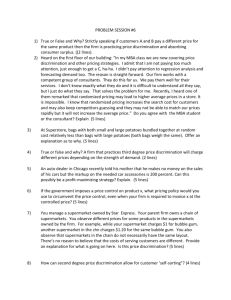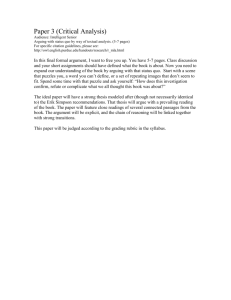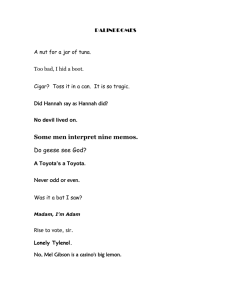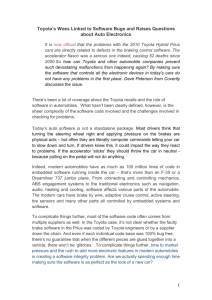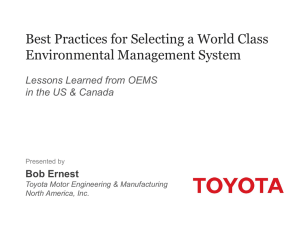Free Will? - Andrew L. Urich, JD
advertisement
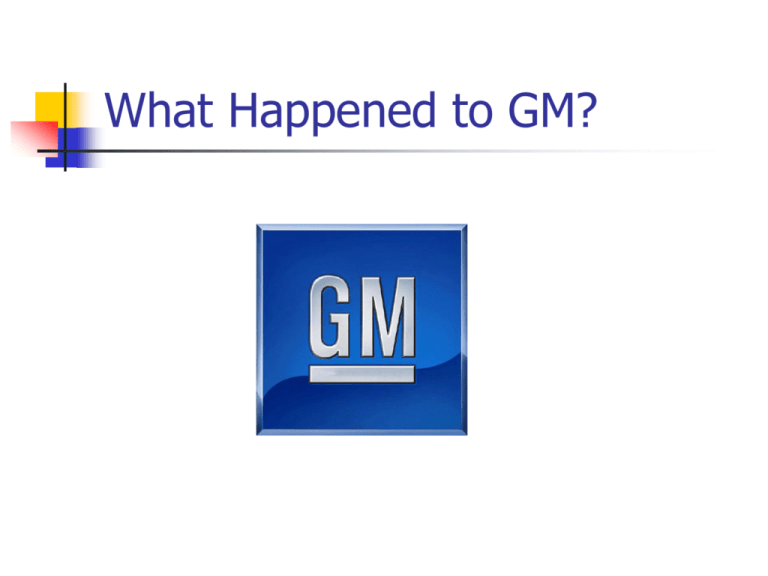
What Happened to GM? GM History 1950’s - Half of all cars in the US I’m Not Piling On GM History 1980 - 853,000 to 284,000 worldwide 1st Q 2009 Passenger cars Toyota GM Honda Nissan Ford Hyundai Chrysler Mazda BMW VW Kia Subaru 19.4% 15% 12.4% 10.2% 10.0% 6.2% 5.2% 3.4% 3.2% 3.2% 2.6% 2.6% Volvo Saab 0.8% 0.2% JD Power Top 10 Reliability 2004 Buick Lexus Cadillac Mercury Honda Toyota BMW Lincoln Subaru Jaguar 145 145 162 168 169 178 182 182 192 197 Focus On What Matters BMW “We don’t make automobiles [we make] moving works of art that express the drivers love of quality.” Honest Design World Cars Porsche VW Beetle Volvo BMW Jeep Benz Bureaucracy & the Status Quo Risk taker to Risk avoidance Cash poor to Cash comfortable Contribution to Playing favorites Opportunities to Problems Marketing & sales to Finance & bean-counting Momentum to Inertia Working to Meetings END Market Value versus Cumulated Strategic Investments at General Motors $167 Billion or $332 Billion 100 50 0 1980 1982 1983 1984 1985 1986 1987 1988 1989 1990 1991 1992 1993 1994 1995 1996 1997 -50 -100 -150 -200 -250 -300 -350 -400 $ Billion 1981 Market Value Strategic Investments 0% 10% Ross Perot on the Subject From 1980 to 1985 GM spent $45 billion in capital investments but only increased worldwide market share by 1%....... "For the same amount of money, we could buy Toyota and Nissan outright, instantly increasing market share to 40%.” Gorilla dust GM Highlights Planned obsolescence (lack of real competition) “No money” in small cars (calculate with certainty) Fuel economy legislation in 80s (unintended consequence) Same design centers (status quo and lack of diverse opinion) Competition between design departments (beliefs) Bring in “paid renegade” Competition is the best motivator Avoid failure De Lorean fired at GM Iacocca fired at Ford Focus on financing cars (avoiding difficult issues) GM Highlights Corporate Culture Car guys and bean counters– no marketing Stability over conflict Continuity over disorder Status quo over change 50 year old decision making structure Conformity over rebellion Caught unprepared at the oil crisis of ‘73 Robot automation 1999 “The most versatile vehicle on earth” “Lifestyle support vehicle” 1999 “The most versatile vehicle on earth” “Lifestyle support vehicle” 1999 “The most versatile vehicle on earth” “Lifestyle support vehicle” Sequel: Fuel Cell 9/2006 Due 2010 “Leapfrog the Japanese” “A Game Changer” Volt: Electric Car 12/2006 “A game changer” “Beat the Japanese at their own game” Now Lost 72 billion in last 4 years – no heads rolled Bob Lutz to save the day – global product development Tom Stephens, who runs the company's power-train unit Carl-Peter Forster London, Germany and Greece BMW, Opel Market Cap November 2008 GM = 1.2 Billion Toyota + Honda = $146.3 Billion Ask Rick Wagoner why GM isn’t more like Toyota. (69/70) “We’re playing our own game – taking advantage of our own unique heritage and strengths.” Does Bureaucracy Materialize Out of Nowhere? Critical Thinking In Action Entrepreneur 1. 2. 3. 4. 5. 6. 7. 8. END Adapt & Change Risk taker Contrarian Focus on what matters 1. Bias toward action 2. Customer focus 3. Problem solver Emphasis on big picture 1. Start at the end Spread the wealth 1. Big pie thinking Lead with personality Benefits of conflict - Bureaucrat Status quo and rules Status quo and rules Follow the herd Doing my job Keep your head down Internal focus Problems?? What problems? Doing my job - Conserve the wealth - Lead with position & policy Avoid conflict play politics Fighting the Status Quo Easiest Things To Do in Business Witch hunts Cut costs Beat up dealers/suppliers Have meetings Protect turf Avoid mistakes by avoiding action Random acts of management Fighting the Status Quo Bad Rules Rules do not create ethical organizations Salary limitations No raises over 10% Can’t go above pay grade 16 without supervising people $40,000 commission dispute The new inventory stickers Minimum order $100 Across the board budget cuts Approve capital purchases Control vs. incentives Risk Taking Total US Stock Market NASDAQ 1982 value = $1.2 Trillion Return 1982 to 2007 13.3% Theoretical 2007 value $28.2 Trillion Actual value $18.7 Trillion Lost to market timing $9.5 Trillion 9.6% Return 1973 – 2002 4.3% Actual average return to NASDAQ investor Zweig, Jason, Money Magazine, December 2007, page 76 Contrarian Michael Bloomberg “Luck is preparation meeting opportunity.” “To a contrarian like me, constant advice not to do something almost always starts me down the risky unpopular path.” Focus On What Matters In 1998 Daimler bought Chrysler for $36 Billion Nine years later they paid $680 Million for some one to take it Focus On What Matters Bias Toward Action Daimler concentrated on cost cutting and production Daimler Committees, meetings, and binders Competing kingdoms Overlapping models Long lead times Dealers pitted against Chrysler and each other Too much cost cutting Focus On What Matters Bias Toward Action Private equity takes over Chrysler Private equity concentrated on marketing and quality CEO reviews cars and barks out orders — no more binders or meetings 7 days to fix quality problems Old CEO took a demotion to stay Attracted talent from Lexus and Toyota Cut 4th quarter 2007 production by 14% 100,000 fewer vehicles $1 billion lost cash flow 7 minute phone call with the owners Focus On What Matters Bias Toward Action Private equity takes over Chrysler Customer focus Hired “Chief Customer Officer” Dealer is customer too Stopped pitting dealer against dealer Tripled goodwill allowance to dealers Lexus dealers are the most profitable Focus on What Matters Create Value HR, Internal audit, Purchasing– evaluated by external clients Emphasis on Big Picture Lead With Personality Influence Skills “It doesn’t matter what you say– it matters how you make people feel.” Message needs to motivate– change thought and behavior “Our mission is to unlock shareholder value.” Cranium: CHIFF, Clever, High-quality, Innovative, Friendly & Fun BP: “No dry holes.” Lead With Personality De-motivation Lou Holtz at Notre Dame, “It’s not my job to motivate my players…” Should you treat everyone equally? Conflict Is Underrated “Where all think alike, no one thinks very much.” Walter Lipman Need for diversity Run off renegades Create Wealth vs. Maintain Wealth Applications Learn to start with the end in mind and work backward to ensure that all efforts are productively applied. Rage against bureaucracy and the status quo. Examine decisions and analysis from the contrarian point of view. Make work fun. Facilitate creativity. Ensure a “share the wealth” organizational attitude. END Applications Jack Welch Bureaucracy Busting Leader sets the tone Problems Processes Titles Avoid conflict Presentations– one-way communication Unsafe to take a chance Applications Jack Welch Bureaucracy Busting Be relentless and outrageous Celebrate impassioned boundaryless people Love the people who hate meetings Encourage managers swing for the fences Create a culture of excitement END
